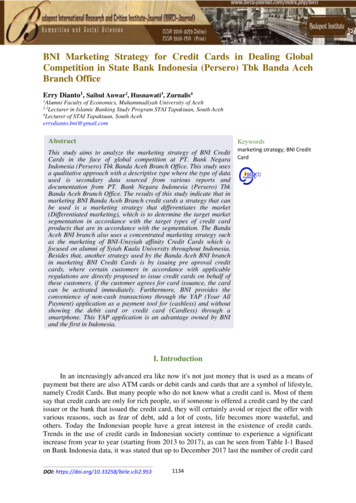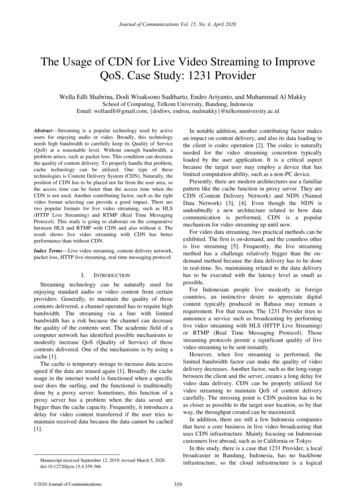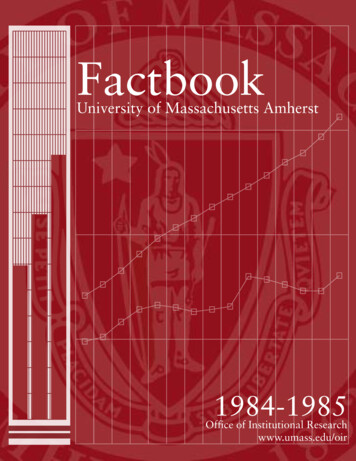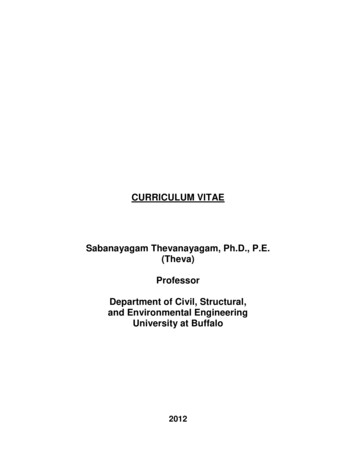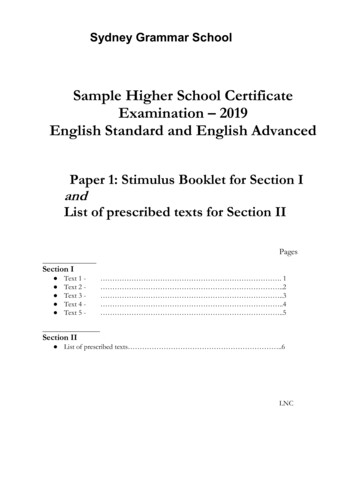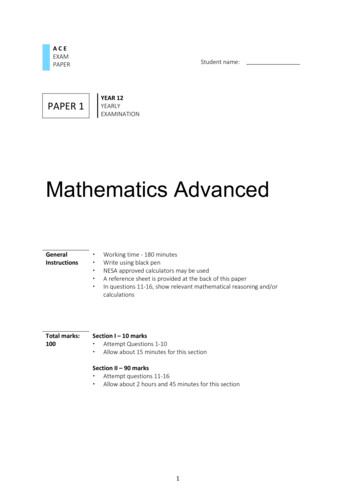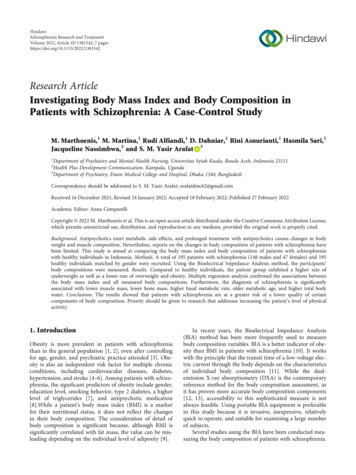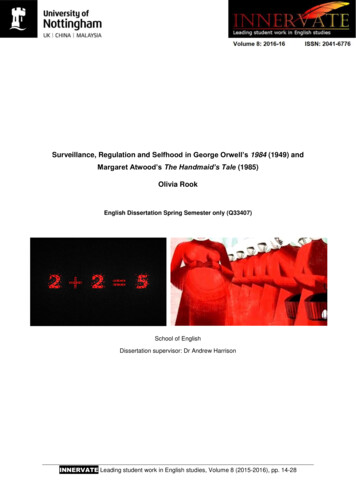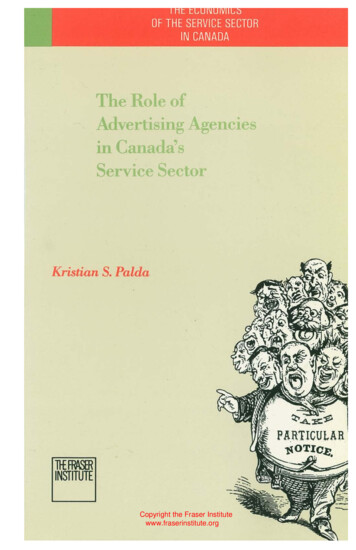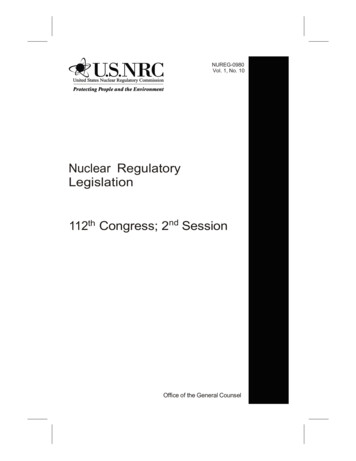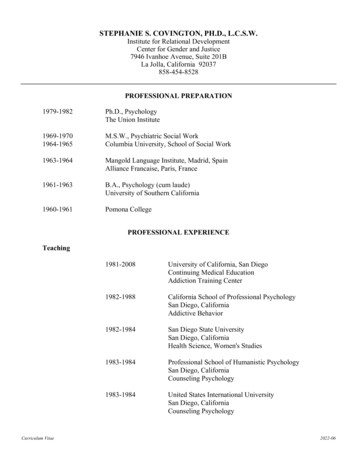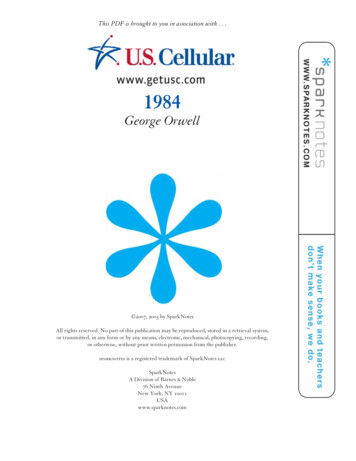
Transcription
This PDF is brought to you in association with . . .1984George Orwell 2007, 2003 by SparkNotesAll rights reserved. No part of this publication may be reproduced, stored in a retrieval system,or transmitted, in any form or by any means, electronic, mechanical, photocopying, recording,or otherwise, without prior written permission from the publisher.sparknotes is a registered trademark of SparkNotes llcSparkNotesA Division of Barnes & Noble76 Ninth AvenueNew York, NY 10011USAwww.sparknotes.com
Brought to you inassociation with:ContextAll rights reserved. No part of this publication may be reproduced, stored in a retrieval system, or transmitted, in any form or by anymeans, electronic, mechanical, photocopying, recording, or otherwise, without prior written permission from the publisher.Born Eric Blair in India in 1903, George Orwell was educated as a scholarship student at prestigiousboarding schools in England. Because of his background—he famously described his family as “lowerupper-middle class”—he never quite fit in, and felt oppressed and outraged by the dictatorial control that theschools he attended exercised over their students’ lives. After graduating from Eton, Orwell decided toforego college in order to work as a British Imperial Policeman in Burma. He hated his duties in Burma,where he was required to enforce the strict laws of a political regime he despised. His failing health, whichtroubled him throughout his life, caused him to return to England on convalescent leave. Once back inEngland, he quit the Imperial Police and dedicated himself to becoming a writer.Inspired by Jack London’s 1903 book The People of the Abyss, which detailed London’s experience in theslums of London, Orwell bought ragged clothes from a second-hand store and went to live among the verypoor in London. After reemerging, he published a book about this experience, entitled Down and Out in Parisand London. He later lived among destitute coal miners in northern England, an experience that caused himto give up on capitalism in favor of democratic socialism. In 1936, he traveled to Spain to report on the Spanish Civil War, where he witnessed firsthand the nightmarish atrocities committed by fascist political regimes.The rise to power of dictators such as Adolf Hitler in Germany and Joseph Stalin in the Soviet Union inspiredOrwell’s mounting hatred of totalitarianism and political authority. Orwell devoted his energy to writingnovels that were politically charged, first with Animal Farm in 1945, then with 1984 in 1949.1984 is one of Orwell’s best-crafted novels, and it remains one of the most powerful warnings ever issuedagainst the dangers of a totalitarian society. In Spain, Germany, and the Soviet Union, Orwell had witnessedthe danger of absolute political authority in an age of advanced technology. He illustrated that peril harshly in1984. Like Aldous Huxley’s Brave New World (1932), 1984 is one of the most famous novels of the negativeutopian, or dystopian, genre. Unlike a utopian novel, in which the writer aims to portray the perfect humansociety, a novel of negative utopia does the exact opposite: it shows the worst human society imaginable, in aneffort to convince readers to avoid any path that might lead toward such societal degradation. In 1949, at thedawn of the nuclear age and before the television had become a fixture in the family home, Orwell’s vision ofa post-atomic dictatorship in which every individual would be monitored ceaselessly by means of the telescreen seemed terrifyingly possible. That Orwell postulated such a society a mere thirty-five years into thefuture compounded this fear.Of course, the world that Orwell envisioned in 1984 did not materialize. Rather than being overwhelmedby totalitarianism, democracy ultimately won out in the Cold War, as seen in the fall of the Berlin Wall andthe disintegration of the Soviet Union in the early 1990s. Yet 1984 remains an important novel, in part for thealarm it sounds against the abusive nature of authoritarian governments, but even more so for its penetratinganalysis of the psychology of power and the ways that manipulations of language and history can be used asmechanisms of control.Copyright 2007, 2003 by SparkNotes2
Brought to you inassociation with:Plot OverviewAll rights reserved. No part of this publication may be reproduced, stored in a retrieval system, or transmitted, in any form or by anymeans, electronic, mechanical, photocopying, recording, or otherwise, without prior written permission from the publisher.Winston Smith is a low-ranking member of the ruling Party in London, in the nation of Oceania.Everywhere Winston goes, even his own home, the Party watches him through telescreens; everywhere helooks he sees the face of the Party’s seemingly omniscient leader, a figure known only as Big Brother. TheParty controls everything in Oceania, even the people’s history and language. Currently, the Party is forcingthe implementation of an invented language called Newspeak, which attempts to prevent political rebellionby eliminating all words related to it. Even thinking rebellious thoughts is illegal. Such thoughtcrime is, infact, the worst of all crimes.As the novel opens, Winston feels frustrated by the oppression and rigid control of the Party, which prohibits free thought, sex, and any expression of individuality. Winston dislikes the party and has illegally purchased a diary in which to write his criminal thoughts. He has also become fixated on a powerful Partymember named O’Brien, whom Winston believes is a secret member of the Brotherhood—the mysterious,legendary group that works to overthrow the Party.Winston works in the Ministry of Truth, where he alters historical records to fit the needs of the Party. Henotices a coworker, a beautiful dark-haired girl, staring at him, and worries that she is an informant who willturn him in for his thoughtcrime. He is troubled by the Party’s control of history: the Party claims that Oceania has always been allied with Eastasia in a war against Eurasia, but Winston seems to recall a time whenthis was not true. The Party also claims that Emmanuel Goldstein, the alleged leader of the Brotherhood, isthe most dangerous man alive, but this does not seem plausible to Winston. Winston spends his eveningswandering through the poorest neighborhoods in London, where the proletarians, or proles, live squalidlives, relatively free of Party monitoring.One day, Winston receives a note from the dark-haired girl that reads “I love you.” She tells him her name,Julia, and they begin a covert affair, always on the lookout for signs of Party monitoring. Eventually they renta room above the secondhand store in the prole district where Winston bought the diary. This relationshiplasts for some time. Winston is sure that they will be caught and punished sooner or later (the fatalistic Winston knows that he has been doomed since he wrote his first diary entry), while Julia is more pragmatic andoptimistic. As Winston’s affair with Julia progresses, his hatred for the Party grows more and more intense.At last, he receives the message that he has been waiting for: O’Brien wants to see him.Winston and Julia travel to O’Brien’s luxurious apartment. As a member of the powerful Inner Party(Winston belongs to the Outer Party), O’Brien leads a life of luxury that Winston can only imagine. O’Brienconfirms to Winston and Julia that, like them, he hates the Party, and says that he works against it as a member of the Brotherhood. He indoctrinates Winston and Julia into the Brotherhood, and gives Winston a copyof Emmanuel Goldstein’s book, the manifesto of the Brotherhood. Winston reads the book—an amalgam ofseveral forms of class-based twentieth-century social theory—to Julia in the room above the store. Suddenly,soldiers barge in and seize them. Mr. Charrington, the proprietor of the store, is revealed as having been amember of the Thought Police all along.Torn away from Julia and taken to a place called the Ministry of Love, Winston finds that O’Brien, too, is aParty spy who simply pretended to be a member of the Brotherhood in order to trap Winston into committing an open act of rebellion against the Party. O’Brien spends months torturing and brainwashing Winston,who struggles to resist. At last, O’Brien sends him to the dreaded Room 101, the final destination for anyonewho opposes the Party. Here, O’Brien tells Winston that he will be forced to confront his worst fear.Throughout the novel, Winston has had recurring nightmares about rats; O’Brien now straps a cage full ofrats onto Winston’s head and prepares to allow the rats to eat his face. Winston snaps, pleading with O’Briento do it to Julia, not to him.Giving up Julia is what O’Brien wanted from Winston all along. His spirit broken, Winston is released tothe outside world. He meets Julia but no longer feels anything for her. He has accepted the Party entirely andhas learned to love Big Brother.Copyright 2007, 2003 by SparkNotes3
Brought to you inassociation with:All rights reserved. No part of this publication may be reproduced, stored in a retrieval system, or transmitted, in any form or by anymeans, electronic, mechanical, photocopying, recording, or otherwise, without prior written permission from the publisher.Character ListWinston SmithA minor member of the ruling Party in near-future London, Winston Smith is a thin,frail, contemplative, intellectual, and fatalistic thirty-nine-year-old. Winston hates thetotalitarian control and enforced repression that are characteristic of his government.He harbors revolutionary dreams.JuliaWinston’s lover, a beautiful dark-haired girl working in the Fiction Department at theMinistry of Truth. Julia enjoys sex, and claims to have had affairs with many Partymembers. Julia is pragmatic and optimistic. Her rebellion against the Party is small andpersonal, for her own enjoyment, in contrast to Winston’s ideological motivation.O’BrienA mysterious, powerful, and sophisticated member of the Inner Party whom Winstonbelieves is also a member of the Brotherhood, the legendary group of anti-Party rebels.Big BrotherThough he never appears in the novel, and though he may not actually exist, BigBrother, the perceived ruler of Oceania, is an extremely important figure. EverywhereWinston looks he sees posters of Big Brother’s face bearing the message “BIGBROTHER IS WATCHING YOU.” Big Brother’s image is stamped on coins andbroadcast on the unavoidable telescreens; it haunts Winston’s life and fills him withhatred and fascination.Mr. CharringtonAn old man who runs a secondhand store in the prole district. Kindly and encouraging,Mr. Charrington seems to share Winston’s interest in the past. He also seems to supportWinston’s rebellion against the Party and his relationship with Julia, since he rentsWinston a room without a telescreen in which to carry out his affair. But Mr.Charrington is not as he seems. He is a member of the Thought Police.SymeAn intelligent, outgoing man who works with Winston at the Ministry of Truth. Symespecializes in language. As the novel opens, he is working on a new edition of theNewspeak dictionary. Winston believes Syme is too intelligent to stay in the Party’sfavor.ParsonsA fat, obnoxious, and dull Party member who lives near Winston and works at theMinistry of Truth. He has a dull wife and a group of suspicious, ill-mannered childrenwho are members of the Junior Spies.Emmanuel Goldstein Another figure who exerts an influence on the novel without ever appearing in it.According to the Party, Goldstein is the legendary leader of the Brotherhood. He seemsto have been a Party leader who fell out of favor with the regime. In any case, the Partydescribes him as the most dangerous and treacherous man in Oceania.Copyright 2007, 2003 by SparkNotes4
Brought to you inassociation with:Analysis of Major CharactersAll rights reserved. No part of this publication may be reproduced, stored in a retrieval system, or transmitted, in any form or by anymeans, electronic, mechanical, photocopying, recording, or otherwise, without prior written permission from the publisher.Winston SmithOrwell’s primary goal in 1984 is to demonstrate the terrifying possibilities of totalitarianism. The readerexperiences the nightmarish world that Orwell envisions through the eyes of the protagonist, Winston. Hispersonal tendency to resist the stifling of his individuality, and his intellectual ability to reason about his resistance, enables the reader to observe and understand the harsh oppression that the Party, Big Brother, and theThought Police institute. Whereas Julia is untroubled and somewhat selfish, interested in rebelling only forthe pleasures to be gained, Winston is extremely pensive and curious, desperate to understand how and whythe Party exercises such absolute power in Oceania. Winston’s long reflections give Orwell a chance to explorethe novel’s important themes, including language as mind control, psychological and physical intimidationand manipulation, and the importance of knowledge of the past.Apart from his thoughtful nature, Winston’s main attributes are his rebelliousness and his fatalism. Winston hates the Party passionately and wants to test the limits of its power; he commits innumerable crimesthroughout the novel, ranging from writing “DOWN WITH BIG BROTHER” in his diary, to having anillegal love affair with Julia, to getting himself secretly indoctrinated into the anti-Party Brotherhood. Theeffort Winston puts into his attempt to achieve freedom and independence ultimately underscores the Party’sdevastating power. By the end of the novel, Winston’s rebellion is revealed as playing into O’Brien’s campaignof physical and psychological torture, transforming Winston into a loyal subject of Big Brother.One reason for Winston’s rebellion, and eventual downfall, is his sense of fatalism—his intense (thoughentirely justified) paranoia about the Party and his overriding belief that the Party will eventually catch andpunish him. As soon as he writes “DOWN WITH BIG BROTHER” in his diary, Winston is positive thatthe Thought Police will quickly capture him for committing a thoughtcrime. Thinking that he is helpless toevade his doom, Winston allows himself to take unnecessary risks, such as trusting O’Brien and renting theroom above Mr. Charrington’s shop. Deep down, he knows that these risks will increase his chances of beingcaught by the Party; he even admits this to O’Brien while in prison. But because he believes that he will becaught no matter what he does, he convinces himself that he must continue to rebel. Winston lives in a worldin which legitimate optimism is an impossibility; lacking any real hope, he gives himself false hope, fullyaware that he is doing so.JuliaJulia is Winston’s lover and the only other person who Winston can be sure hates the Party and wishes to rebelagainst it as he does. Whereas Winston is restless, fatalistic, and concerned about large-scale social issues, Juliais sensual, pragmatic, and generally content to live in the moment and make the best of her life. Winston longsto join the Brotherhood and read Emmanuel Goldstein’s abstract manifesto; Julia is more concerned withenjoying sex and making practical plans to avoid getting caught by the Party. Winston essentially sees theiraffair as temporary; his fatalistic attitude makes him unable to imagine his relationship with Julia lasting verylong. Julia, on the other hand, is well adapted to her chosen forms of small-scale rebellion. She claims to havehad affairs with various Party members, and has no intention of terminating her pleasure seeking, or of beingcaught (her involvement with Winston is what leads to her capture). Julia is a striking contrast to Winston:apart from their mutual sexual desire and hatred of the Party, most of their traits are dissimilar, if not contradictory.O’BrienOne of the most fascinating aspects of 1984 is the manner in which Orwell shrouds an explicit portrayal of atotalitarian world in an enigmatic aura. While Orwell gives the reader a close look into the personal life ofWinston Smith, the reader’s only glimpses of Party life are those that Winston himself catches. As a result,Copyright 2007, 2003 by SparkNotes5
Copyright 2007, 2003 by SparkNotesBrought to you inassociation with:many of the Party’s inner workings remain unexplained, as do its origins, and the identities and motivationsof its leaders. This sense of mystery is centralized in the character of O’Brien, a powerful member of the InnerParty who tricks Winston into believing that he is a member of the revolutionary group called the Brotherhood. O’Brien inducts Winston into the Brotherhood. Later, though, he appears at Winston’s jail cell to abuseand brainwash him in the name of the Party. During the process of this punishment, and perhaps as an act ofpsychological torture, O’Brien admits that he pretended to be connected to the Brotherhood merely to trapWinston in an act of open disloyalty to the Party.This revelation raises more questions about O’Brien than it answers. Rather than developing as a character throughout the novel, O’Brien actually seems to un-develop: by the end of the book, the reader knows farless about him than they previously had thought. When Winston asks O’Brien if he too has been captured bythe Party, O’Brien replies, “They got me long ago.” This reply could signify that O’Brien himself was oncerebellious, only to be tortured into passive acceptance of the Party. One can also argue that O’Brien pretendsto sympathize with Winston merely to gain his trust. Similarly, one cannot be sure whether the Brotherhoodactually exists, or if it is simply a Party invention used to trap the disloyal and give the rest of the populace acommon enemy. The novel does not answer these questions, but rather leaves O’Brien as a shadowy, symbolicenigma on the fringes of the even more obscure Inner Party.analysis of major characters6
Brought to you inassociation with:Themes, Motifs & SymbolsAll rights reserved. No part of this publication may be reproduced, stored in a retrieval system, or transmitted, in any form or by anymeans, electronic, mechanical, photocopying, recording, or otherwise, without prior written permission from the publisher.ThemesThemes are the fundamental and often universal ideas explored in a literary work.The Dangers of Totalitarianism1984 is a political novel written with the purpose of warning readers in the West of the dangers of totalitariangovernment. Having witnessed firsthand the horrific lengths to which totalitarian governments in Spain andRussia would go in order to sustain and increase their power, Orwell designed 1984 to sound the alarm inWestern nations still unsure about how to approach the rise of communism. In 1949, the Cold War had notyet escalated, many American intellectuals supported communism, and the state of diplomacy between democratic and communist nations was highly ambiguous. In the American press, the Soviet Union was oftenportrayed as a great moral experiment. Orwell, however, was deeply disturbed by the widespread crueltiesand oppressions he observed in communist countries, and seems to have been particularly concerned by therole of technology in enabling oppressive governments to monitor and control their citizens.In 1984, Orwell portrays the perfect totalitarian society, the most extreme realization imaginable of a modern-day government with absolute power. The title of the novel was meant to indicate to its readers in 1949that the story represented a real possibility for the near future: if totalitarianism were not opposed, the titlesuggested, some variation of the world described in the novel could become a reality in only thirty-five years.Orwell portrays a state in which government monitors and controls every aspect of human life to the extentthat even having a disloyal thought is against the law. As the novel progresses, the timidly rebellious WinstonSmith sets out to challenge the limits of the Party’s power, only to discover that its ability to control andenslave its subjects dwarfs even his most paranoid conceptions of its reach. As the reader comes to understandthrough Winston’s eyes, The Party uses a number of techniques to control its citizens, each of which is animportant theme of its own in the novel. These include:Psychological ManipulationThe Party barrages its subjects with psychological stimuli designed to overwhelm the mind’s capacity forindependent thought. The giant telescreen in every citizen’s room blasts a constant stream of propagandadesigned to make the failures and shortcomings of the Party appear to be triumphant successes. The telescreens also monitor behavior—everywhere they go, citizens are continuously reminded, especially by meansof the omnipresent signs reading “BIG BROTHER IS WATCHING YOU,” that the authorities are scrutinizing them. The Party undermines family structure by inducting children into an organization called theJunior Spies, which brainwashes and encourages them to spy on their parents and report any instance of disloyalty to the Party. The Party also forces individuals to suppress their sexual desires, treating sex as merely aprocreative duty whose end is the creation of new Party members. The Party then channels people’s pent-upfrustration and emotion into intense, ferocious displays of hatred against the Party’s political enemies. Manyof these enemies have been invented by the Party expressly for this purpose.Physical ControlIn addition to manipulating their minds, the Party also controls the bodies of its subjects. The Party constantly watches for any sign of disloyalty, to the point that, as Winston observes, even a tiny facial twitch couldlead to an arrest. A person’s own nervous system becomes his greatest enemy. The Party forces its members toundergo mass morning exercises called the Physical Jerks, and then to work long, grueling days at government agencies, keeping people in a general state of exhaustion. Anyone who does manage to defy the Party isCopyright 2007, 2003 by SparkNotes7
Copyright 2007, 2003 by SparkNotesBrought to you inassociation with:punished and “reeducated” through systematic and brutal torture. After being subjected to weeks of thisintense treatment, Winston himself comes to the conclusion that nothing is more powerful than physicalpain—no emotional loyalty or moral conviction can overcome it. By conditioning the minds of their victimswith physical torture, the Party is able to control reality, convincing its subjects that 2 2 5.Control of Information and HistoryThe Party controls every source of information, managing and rewriting the content of all newspapers andhistories for its own ends. The Party does not allow individuals to keep records of their past, such as photographs or documents. As a result, memories become fuzzy and unreliable, and citizens become perfectly willing to believe whatever the Party tells them. By controlling the present, the Party is able to manipulate thepast. And in controlling the past, the Party can justify all of its actions in the present.TechnologyBy means of telescreens and hidden microphones across the city, the Party is able to monitor its membersalmost all of the time. Additionally, the Party employs complicated mechanisms (1984 was written in the erabefore computers) to exert large-scale control on economic production and sources of information, and fearsome machinery to inflict torture upon those it deems enemies. 1984 reveals that technology, which is generally perceived as working toward moral good, can also facilitate the most diabolical evil.Language as Mind ControlOne of Orwell’s most important messages in 1984 is that language is of central importance to human thoughtbecause it structures and limits the ideas that individuals are capable of formulating and expressing. If controlof language were centralized in a political agency, Orwell proposes, such an agency could possibly alter thevery structure of language to make it impossible to even conceive of disobedient or rebellious thoughts,because there would be no words with which to think them. This idea manifests itself in the language ofNewspeak, which the Party has introduced to replace English. The Party is constantly refining and perfecting Newspeak, with the ultimate goal that no one will be capable of conceptualizing anything that mightquestion the Party’s absolute power.Interestingly, many of Orwell’s ideas about language as a controlling force have been modified by writersand critics seeking to deal with the legacy of colonialism. During colonial times, foreign powers took politicaland military control of distant regions and, as a part of their occupation, instituted their own language as thelanguage of government and business. Postcolonial writers often analyze or redress the damage done to localpopulations by the loss of language and the attendant loss of culture and historical connection.MotifsMotifs are recurring structures, contrasts, and literary devices that can help to develop and inform the text’smajor themes.DoublethinkThe idea of “doublethink” emerges as an important consequence of the Party’s massive campaign of largescale psychological manipulation. Simply put, doublethink is the ability to hold two contradictory ideas inone’s mind at the same time. As the Party’s mind-control techniques break down an individual’s capacity forindependent thought, it becomes possible for that individual to believe anything that the Party tells them,even while possessing information that runs counter to what they are being told. At the Hate Week rally, forinstance, the Party shifts its diplomatic allegiance, so the nation it has been at war with suddenly becomes itsally, and its former ally becomes its new enemy. When the Party speaker suddenly changes the nation herefers to as an enemy in the middle of his speech, the crowd accepts his words immediately, and is ashamed tofind that it has made the wrong signs for the event. In the same way, people are able to accept the Party ministhemes, motifs & symbols8
Copyright 2007, 2003 by SparkNotesBrought to you inassociation with:tries’ names, though they contradict their functions: the Ministry of Plenty oversees economic shortages, theMinistry of Peace wages war, the Ministry of Truth conducts propaganda and historical revisionism, and theMinistry of Love is the center of the Party’s operations of torture and punishment.Urban DecayUrban decay proves a pervasive motif in 1984. The London that Winston Smith calls home is a dilapidated,rundown city in which buildings are crumbling, conveniences such as elevators never work, and necessitiessuch as electricity and plumbing are extremely unreliable. Though Orwell never discusses the theme openly,it is clear that the shoddy disintegration of London, just like the widespread hunger and poverty of its inhabitants, is due to the Party’s mismanagement and incompetence. One of the themes of 1984, inspired by the history of twentieth-century communism, is that totalitarian regimes are viciously effective at enhancing theirown power and miserably incompetent at providing for their citizens. The grimy urban decay in London isan important visual reminder of this idea, and offers insight into the Party’s priorities through its contrast tothe immense technology the Party develops to spy on its citizens.SymbolsSymbols are objects, characters, figures, and colors used to represent abstract ideas or concepts.Big BrotherThroughout London, Winston sees posters showing a man gazing down over the words “BIG BROTHERIS WATCHING YOU” everywhere he goes. Big Brother is the face of the Party. The citizens are told thathe is the leader of the nation and the head of the Party, but Winston can never determine whether or not heactually exists. In any case, the face of Big Brother symbolizes the Party in its public manifestation; he is a reassurance to most people (the warmth of his name suggests his ability to protect), but he is also an open threat(one cannot escape his gaze). Big Brother also symbolizes the vagueness with which the higher ranks of theParty present themselves—it is impossible to know who really rules Oceania, what life is like for the rulers, orwhy they act as they do. Winston thinks he remembers that Big Brother emerged around 1960, but the Party’sofficial records date Big Brother’s existence back to 1930, before Winston was even born.The Glass Paperweight and St. Clement’s ChurchBy deliberately weakening people’s memories and flooding their minds with propaganda, the Party is able toreplace individuals’ memories with its own version of the truth. It becomes nearly impossible for people toquestion the Party’s power in the present when they accept what the Party tells them about the past—that theParty arose to protect them from bloated, oppressive capitalists, and that the world was far uglier and harsherbefore the Party came to power. Winston vaguely understands this principle. He struggles to recover his ownmemories and formulate a larger picture of what has happened to the world. Winston buys a paperweight inan antique store in the prole district that comes to symbolize his attempt to reconnect with the past. Symbolically, when the Thought Police arrest Winston at last, the paperweight shatters on the floor.The old picture of St. Clement’s Church in the room that Winston rents above Mr. Charrington’s shop isanother representation of the lost past. Winston associates a song with the picture that ends with the words“Here comes the chopper to chop off your head!” This is an important foreshadow, as it is the telescreen hidden behind the picture that ultimately leads the Thought Police to Winston, symbolizing the Party’s corruptcontrol of the past.The Place Where There Is No DarknessThroughout the novel Winston imagines meeting O’Brien in “the place where there is no
1984 in 1949. 1984 is one of Orwell's best-crafted novels, and it remains one of the most powerful warnings ever issued against the dangers of a totalitarian society. In Spain, Germany, and the Soviet Union, Orwell had witnessed the danger of absolute political authority in an age of advanced technology. He illustrated that peril harshly in 1984.
